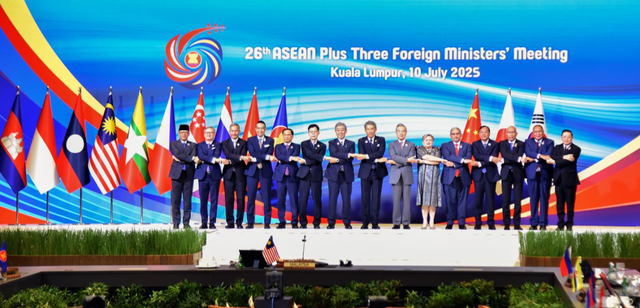ASEAN expects to maintain stable, mutually beneficial trade with U.S.
VGP – ASEAN Member States have affirmed that they wish to engage in constructive dialogue with the U.S. to maintain stable, fair, sustainable and mutually beneficial trade relations with the U.S.

Foreign Ministers from ASEAN Member States, China, South Korea and Japan to the ASEAN Plus Three Foreign Ministerial Meeting in Kuala Lumpur, Malaysia, July 10, 2025
Deputy Prime Minister and Foreign Minister Bui Thanh Son on Wednesday attended a series of ministerial meetings between ASEAN and its partners like Japan, Russia, South Korea and the U.S.
At these meetings, ASEAN and its partners committed to further deepening relations in a practical and effective manner.
Given the current context in the region and the world, the participating countries underscored the need to enhance dialogue, cooperation and coordinated actions to deal with common challenges, thus contributing to maintaining peace, security and stability and to promoting inclusive and sustainable growth.
ASEAN's partners reaffirmed their support for ASEAN centrality and for the bloc to implement the its Vision 2045, with special focus on such areas as digital transformation, innovation, green conversion, energy transition, artificial intelligence and emerging technologies.
At the ASEAN-Japan ministerial meeting, Japanese Foreign Minister Takeshi Iwaya emphasized that the relations between ASEAN and Japan have been nurtured on the basis of friendship, cooperation and trust over the past more than five decades.
Both sides stressed the need to promptly upgrade the ASEAN-Japan Comprehensive Economic Partnership (AJCEP) to include new growth dimensions like digital development, green development, and supply chain.
ASEAN welcomed Japan's assistance for improving business environment, advancing the development of small and medium-sized enterprises, promoting sustainable development, and narrowing development gap and sub-regional development.
At the ASEAN-Russia ministerial meeting, Russian Foreign Minister Sergei Lavrov affirmed that ASEAN remains a trusted partner of Russia. He pledged to boost cooperation with ASEAN on the basis of the United Nations Charter, thus contributing to sustaining stability in Asia-Pacific.
Both sides agreed to bolster economic cooperation, especially in such fields like digital economy, innovation, supply chain, sustainable tourism, clean energy and development of small and medium-sized enterprises.
ASEAN spoke highly of the role of the ASEAN-Eurasian Economic Union Business Forum and the ASEAN-Russia Business Council in connecting the two sides' business communities.
Both sides agreed to formulate an ASEAN-Russia Action Plan for the 2026-2030 and to prepare for the celebration of the 30th anniversary of the ASEAN-Russia relations in 2026.
At the ASEAN-South Korea ministerial meeting, Korean Deputy Foreign Minister Park Yoon-joo reaffirmed his country's commitment to continue deepening and expand relations with ASEAN on the basis of mutual trust, respect and benefits.
Both sides acknowledged the efforts to prepare for negotiations on upgrading the ASEAN-South Korea Free Trade Agreement (AKFTA), ensuring the agreement's relevance to the current economic context.
ASEAN welcomed initiatives for security and sustainable future such as the ASEAN-Korea High Performance Computing (HPC) Infrastructure and Capacity Building Project worth US$10 million, the ASEAN-Korea Startup Partnership, and the ASEAN-Korea Cooperation on Methane Mitigation Project worth US$20 million, along with many other cooperation programs aimed at narrowing development gap, fostering sub-regional connectivity and advancing green transition.
At the ASEAN-U.S. ministerial meeting, U.S. Secretary of State Marco Rubio affirmed that the Indo-Pacific region remains a focus of the U.S. foreign policy. He affirmed the U.S. long-standing commitment to ASEAN – the primary mechanism for the U.S. to enhance engagement in the region.
The U.S. is the second largest trading partner and the top investor in ASEAN, with the two-way trade surpassing US$450 billion and investment capital volume reaching US$42 billion in 2024.
ASEAN Member States affirmed their wish to engage in constructive dialogue with the U.S. to maintain stable, fair, sustainable and mutually beneficial trade relations.
At the ASEAN Plus Three Meeting, Foreign Ministers from ASEAN Member States, China, Japan and South Korea emphasized the need to promote their unique strengths to cope with the current volatile economic situation and support a fair and rules-based multilateral trading system.
The Foreign Ministers agreed to strengthen cooperation to ensure energy security and food security, promote smart agriculture and renewable energy, and support the process of green transition and sustainable growth in the region.
Addressing these meetings, Deputy Prime Minister and Foreign Minister Bui Thanh Son underscored the importance of bolstering comprehensive cooperation between ASEAN and its partners.
Given the current context, Bui urged countries to promote dialogue, trust building, and formulation of an inclusive and transparent regional architecture on the basis of international law, in which ASEAN plays the central role, while enhancing cooperation to cope with non-traditional security challenges such as cybersecurity, energy security, and food security.
He affirmed ASEAN's principled positions on regional and international issues, including the East Sea issue, calling on partners to support the efforts to build the East Sea into the sea of peace, stability, cooperation and sustainable development.
Bui urged the partners to work with ASEAN to upgrade free trade agreements, including the AJCEP and AKFTA, and to prioritize energy cooperation to ensure sustainable energy security and just energy transition in the region./.
